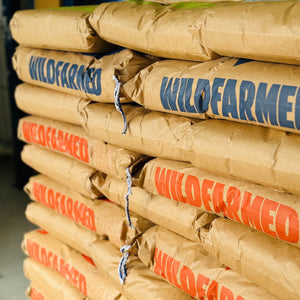Stoates Organic True South West Stoneground Strong White Bread Flour
Ratton Pantry is proud to now being able to offering the True South West Flour brought to you through the South West Grain Network. This full Organic flour contains 100% grain grown within the South West of England and milled by Stoates.
The Grain is a population wheat with a blend of Marigertoba and YQ and also a non-commodity wheat meaning we are paying the farmers what their grain is actually worth rather than the price being determined by the global market. This does bring a higher cost per KG to the flour however in this ever-changing climate this is what is needed to support our farmers. It also means we can visit each farm and grow relationships between farmer, miller and baker so all businesses can be supported and ensure a healthy economy.
Being a population wheat, this does mean that it is a mix of many different varieties of wheat increasing crop biodiversity and making a more resilient crop which for Organic growing is one of the main struggles due to not adding additional inputs to the soil. The hope is that there will always be some usable grain for the farmer even in a bad year and as we continue to use the grain it should develop and evolve to our climate over time.
This is a strong flour and will be good for bread making and offering a great flavour to back it up. As are all our flours, this has been stoneground on horizontal millstones.
No added ingredients or fortification.
Certified Organic by The Soil Association.
Protein: 13%
Buy Stoates Organic True South West Stoneground Strong White Bread Flour at Ratton Pantry.
About Stoates (Cann Mills).
Brothers William and Thomas Stoate started the family off down the path of flour milling in 1832 taking on the lease of a mill at Watchet in Somerset. Their father John Stoate had been a maltster and a tanner and there was a background of farming in the family all based around this part of the West Country so milling was not too far detached. The business prospered both with local trade and also in satisfying the growing demand for flour in South Wales. Sailing ketches would transport the flour across the Severn (and return with coal!) while horse and cart took care of the local deliveries. By 1877 Thomas had left the business to become a successful grain merchant and William was joined by two sons, William and John and later a third son James.
In 1912 the business had outgrown the Watchet site and a new mill was built at Temple Back in Bristol. By this time the huge demand for white flour meant that the ‘roller milling’ system had taken over from the traditional method of grinding the corn between stones. My grandfather Leonard Stoate (son of James Stoate) was the technical director of this new mill and saw the enterprise grow through much transformation and expansion of market area.
The business amalgated with Spillers in 1933 but the family were still actively involved in operations. Brothers David and Norman (sons of Leonard Stoate) carried the family into its fourth generation of milling. My father, Norman Stoate, started out on his own at Cann Mills (the present site) in 1947 taking on what was a country mill supplying animal feed to the many local farmers. Cann Mills was recorded in the Domesday Book and one of five mills within a mile on The Sturkel, a tributary to the River Stour.
In 1970 the business returned to its roots producing stoneground flour using French Burr millstones primarily driven by a late 19th Century iron waterwheel powered by the river Sturkel.
Over 180 years later, now in its fifth generation, Stoate & Sons is still producing quality stoneground flour supplying both the domestic and bakery trade throughout the West Country and beyond. The growth in popularity for traditionally produced artisan breads and the increased desire towards home baking has helped this authentic flour milling legacy to continue along its path.







